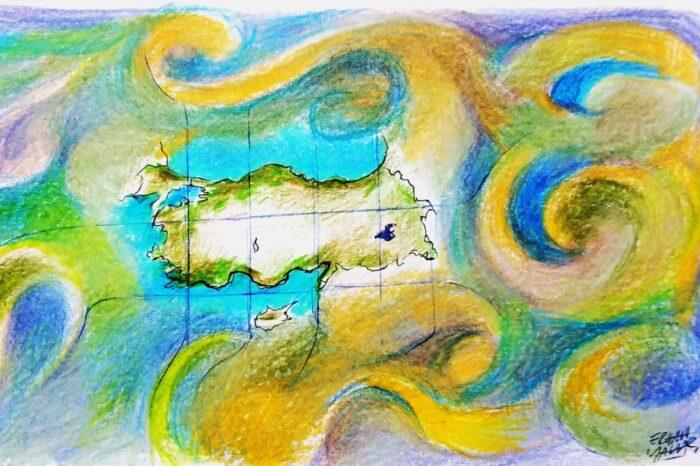Turkey’s June 24 elections are about stability

Turkey will hold presidential and parliamentary elections on June 24 in an historic vote that will transform the country’s political system from a parliamentary to a presidential one.
For decades, the Turkish political system has been defined by the outsized role of the military and civilian bureaucracy in state affairs.
In 1922, the Turkish republic was born out of the ashes of a collapsed empire attacked by great and small powers trying to divide the vast territories it ruled over. “Protecting” the new Turkish state from its various enemies was the main preoccupation of its leadership at that time and it created a political system to serve this purpose.
As a result of this set-up, the Turkish political system has gone through multiple constitutional changes, decades of bureaucratic sway over the will of the Turkish people, hard and soft military coups, and most recently, the coup attempt of July 15, 2016.
But the dominance of the bureaucracy and military over civilian affairs started to be questioned over the past two decades with the growing assertiveness of civilian power in the political arena. The June 24 elections promise to bring to an end the systemic instability caused by these tensions.
The end of the ‘tutelary system’
The system which used to rule over the Turkish state since the 1960s was a “tutelary system” – one in which the civilian and military bureaucratic elites, the high courts, and the office of the presidency held the real power. Elected civilian governments were overseen by these institutional “guardians of the state” who often ignored the will of the Turkish people.
For decades, the main political challenge to democracy in Turkey was that the civil society never fully participated in the drafting of the constitution. Many attempts were made, but every effort was limited to piecemeal amendments and some changes to the bureaucratic structures which resulted in partial modifications of the system.
The transformation of Turkey’s political system will usher in a period of stability for civilian rule.
The switch to a presidential system that will take place after the June 24 elections will be the most substantial change to Turkey’s modern political system since 1922. The seeds of this transformation were sown in 2007 when the opposition of the tutelary elites to the presidential candidate of the ruling Justice and Development Party (AK Party) brought forward the question of whether the president should be directly elected by the Turkish people rather than the parliament.
That same year, a referendum was held and the Turkish people showed overwhelming support for holding presidential elections, with 69 percent voting yes.
Over the next 10 years, the Turkish people would repeatedly show support at the polls for the direction in which the AK Party and its leader Recep Tayyip Erdogan were taking Turkey’s transformation.
Throughout this period, there were discussions about transforming the political system into a presidential one to eliminate endemic instability and prevent bureaucratic elites from holding sway over the will of the people.
In 2017, a referendum was held to decide on the matter and 51.4 percent voted yes.
In an effort to address the issue of unstable coalition governments under the parliamentary system, the new presidential system gives full executive power to the president who will be elected with more than 50 percent of the vote through direct elections.
This new system gives the president the kind of legitimacy that no previously elected official with executive power enjoyed. Regardless of the party distribution of parliamentary seats, the president will be able to put together a cabinet, which will guarantee the stability of the executive branch.
Stability and the politics of compromise
In the new presidential system, the parliament will be responsible for legislation without having to worry about establishing a government.
The previous system experienced a number of periods of instability when no single party would win a large enough majority to form a government after elections. Efforts to establish coalition governments not only took time but also weakened the position of civilian governments against the bureaucratic elites.
In practice, this allowed the bureaucratic elites to convey their preferences to civilian party leaders and hold sway over their decisions. It also brought about economic troubles.
Under the new presidential system, if no single party manages to gain the majority of seats, parties will have to come up with compromises and negotiations to pass legislation, but this will not hamper the formation and the functioning of a government by the executive branch.
Currently, Erdogan is leading in the polls for the presidential elections while the AK Party alliance with the Nationalist Movement Party (MHP) has emerged on top in projections for the parliamentary vote.
The alliance could gain enough seats to win a parliamentary majority and it is even possible for the AK Party to win the majority of the seats on its own. If the polls turn out to be correct, both establishing a government and pushing forward the legislative agenda of the current ruling party will go relatively smoothly.
However, if the AK Party does not win the majority of the seats in parliament, the legislative agenda will have to be negotiated with other parties and compromises will have to be made. Even in this scenario, the executive or the legislative branch of government will not be obstructed from functioning properly.
Despite offering the prospect of stability, the presidential system is not without opposition. The opposition presidential candidate Muharrem Ince has made some populist promises to reverse the presidential system, if elected.
This is hardly surprising given that his Republican People’s Party (CHP) was historically close to the tutelary system. However, it is not clear how he plans to convince the Turkish people to go back on what they decided in the 2017 referendum.
Every change to a political system will take time to implement and go through various challenges and crises to mature. Turkey’s move to the presidential system will be no exception.
This article was first published at Al Jazeera on June 21, 2018.























